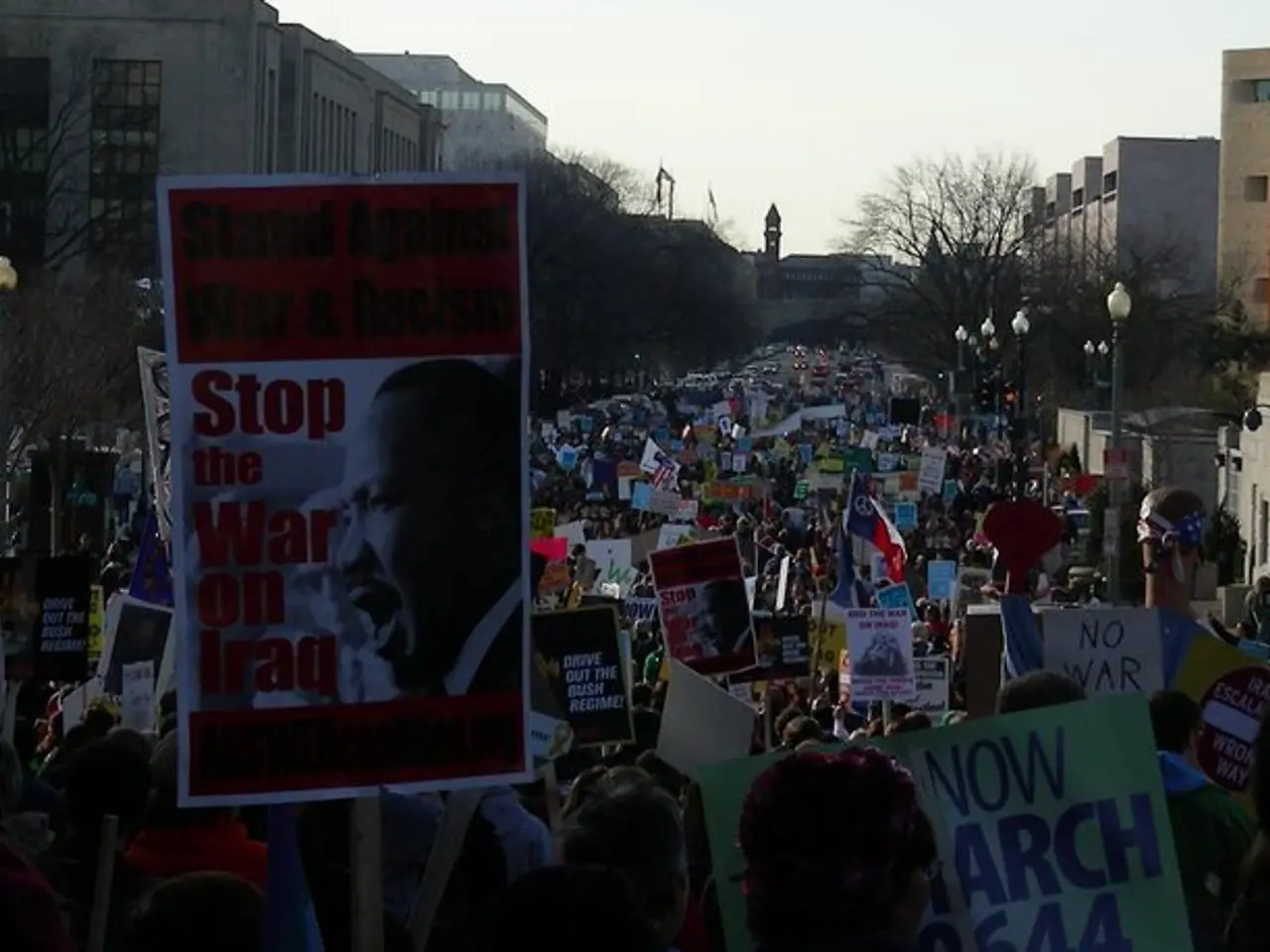United States troops stationed in South Korea will continue without change, according to FM Cho, disregarding rumors of troop reduction.
The Trump administration has proposed a potential reduction in the size of the US Forces Korea (USFK), currently numbering 28,500 troops, with plans to scale down to as few as 10,000 personnel [1]. This move is driven by a desire to increase South Korea's financial contribution towards hosting the troops and to shift the US military focus towards countering China in the broader Indo-Pacific region [1][2].
The proposed troop reductions and strategic realignments aim to redefine the role of USFK, moving it away from primarily deterring North Korea to a more China-focused posture. This could leave South Korea with greater direct responsibility for its defense against North Korean threats [4].
The implications for South Korea and US relations are significant:
- Increased burden-sharing demands: The Trump administration has persistently pressed South Korea to pay more for the US military presence, a demand that has led to friction between the allies [1][4].
- Strategic uncertainty for South Korea: The shift in the US defense strategy, with China being highlighted as the main threat and focusing on Taiwan, may complicate Seoul's security calculus. South Korea might face heightened costs and risks with potentially fewer US troops dedicated directly to its defense [2][4].
- Alliance tension: These moves could strain U.S.-South Korea relations by undermining longstanding assumptions about US commitment levels. South Korea might need to navigate greater strategic autonomy or seek expanded regional cooperation in response [3][4].
- Regional security dynamics: With North Korea continuing its nuclear ambitions and aligning more closely with Russia, uncertainties in the US troop posture could embolden Pyongyang and alter regional deterrence stability [5].
Meanwhile, South Korea, under the new Lee Jae Myung government, seeks to maintain good relations with China, despite its economic and geopolitical rise being somewhat problematic for its neighbors. South Korea will work with neighboring Japan to address challenges posed by China, emphasizing the need for engagement with Beijing rather than containment [6].
In a recent visit to Washington, South Korea's Foreign Minister Cho met with US Secretary of State Marco Rubio and other US government officials, lawmakers, and think tank experts. Cho emphasized that all actions will be in good collaboration with the United States [7]. The US reciprocal tariff rate for South Korea has been lowered from the originally proposed 25 percent to 15 percent, and South Korea has committed to investing US$350 billion in US industries in return for the tariff reduction [8].
Despite rumours of troop reduction, South Korea's Foreign Minister Cho has stated that the US forces stationed in South Korea will remain unchanged [9]. Cho assesses that the recent tariff agreement with the Trump administration is a "win-win" proposal that aims to reduce the trade imbalance for the US while giving South Korea a chance to remain competitive in manufacturing areas [10].
The Chinese Embassy in Seoul maintains favorable relations with all neighboring nations, with most viewing strengthening friendly cooperation with China as a priority [11]. However, South Korea, like many other nations, expects China to adhere to international law in both bilateral and regional affairs [12].
In conclusion, the Trump administration's plans to reduce US troop levels in Korea and reshape their mission towards a broader Indo-Pacific focus against China may increase South Korea's defense burden, shift alliance dynamics, and create strategic challenges within the U.S.-South Korea security relationship [1][2][4]. South Korea, on the other hand, is seeking to maintain good relations with China while working closely with the US and Japan to address regional security challenges.
[1] https://www.reuters.com/world/us/us-said-considering-reducing-troop-levels-south-korea-sources-2021-08-23/ [2] https://www.reuters.com/business/us-south-korea-trade-agreement-could-face-senate-hurdles-2021-07-12/ [3] https://www.reuters.com/world/us/us-south-korea-troop-reduction-could-strain-ties-japan-2021-08-23/ [4] https://www.reuters.com/world/asia-pacific/us-south-korea-troop-reduction-could-shift-alliance-dynamics-security-experts-2021-08-24/ [5] https://www.reuters.com/world/asia-pacific/us-troop-reduction-south-korea-could-embolden-north-korea-experts-2021-08-24/ [6] https://www.reuters.com/world/china/south-korea-says-will-work-japan-address-china-challenges-2021-08-25/ [7] https://www.reuters.com/world/us/south-korea-foreign-minister-cho-meets-us-officials-lawmakers-think-tank-experts-2021-08-23/ [8] https://www.reuters.com/world/us/us-south-korea-trade-agreement-could-face-senate-hurdles-2021-07-12/ [9] https://www.reuters.com/world/us/south-korea-foreign-minister-says-us-troop-levels-south-korea-will-remain-unchanged-2021-08-24/ [10] https://www.reuters.com/world/us/south-korea-says-us-tariff-agreement-win-win-proposal-2021-08-24/ [11] https://www.reuters.com/world/china/chinese-embassy-says-maintains-favorable-relations-neighboring-nations-2021-08-24/ [12] https://www.reuters.com/world/china/south-korea-expresses-desire-maintain-good-relations-china-adhere-international-law-2021-08-25/
- The shift in US military strategy towards countering China in the Indo-Pacific region, as a result of the proposed reduction in US Forces Korea (USFK), could lead to policy-and-legislation discussions regarding South Korea's increased financial contribution and defense responsibilities against war-and-conflicts, particularly North Korea.
- The US-South Korea relationship, altered by the proposed USFK troop reductions and realignments, could potentially impact politics and the general news landscape as both countries navigate strategic uncertainties, alliance tensions, and shifts in regional security dynamics.








